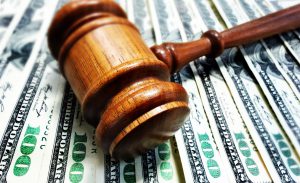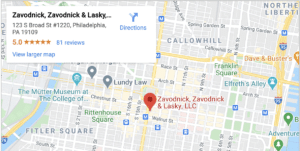
Personal injury covers many different types of situations and accidents that result in injury.
The one element that all the cases have in common is that the person sustained damages.
If a person does not sustain damages because of an accident or injury, the person cannot demand compensation from the other party.
Table of Contents
What Types of Personal Injury Cases Result in Damages?

Most injury cases result in damages. When a person sustains a physical injury in a car accident, the person generally incurs medical bills because of the personal injuries.
Medical expenses are a type of damage that can be compensated under Pennsylvania’s personal injury laws.
Motor vehicle accidents are not the only situation that can result in damages. Wrongful death claims, construction accidents, and slip and fall accidents are other examples of cases that can result in damages. Medical malpractice claims and claims involving defective products are also examples of cases involving damages.
If another person or party causes your injury, you may be entitled to compensation for damages. The types of damages you might receive vary, depending on the facts of your case. Our experienced Philadelphia injury lawyers can review your case during a free consultation and provide you with a legal analysis regarding your options for receiving compensation.
What Are the Types of Damages in a Personal Injury Claim?
Most personal injury claims involve two types of damages – economic damages and non-economic damages. Economic and non-economic damages are typically referred to as compensatory damages because the damages “compensate” the victim for losses caused by the accident or injury. In some cases, punitive damages might also be awarded.
Examining each of the three types of damages can give you a better idea of how a personal injury claim is valued.
What Are Economic Damages?

Economic damages, also known as special damages, are measurable financial losses related to the accident and your injuries. You would not have incurred the financial losses had it not been for the at-fault party’s wrongdoing or negligence.
Examples of economic damages include, but are not limited to:
- Medical bills from hospitals, doctors, ambulance services, therapists, diagnostic laboratories, and other medical providers
- Medical expenses, such as the cost of medication, medical equipment, and medical supplies
- Services provided by in-home health care aides
- The costs of personal services, such as assistance with bathing, eating, dressing, or housecleaning
- Long-term medical and personal care in a nursing home or assisted care facility
- Loss of income from lost wages, bonuses, salaries, commissions, benefits, and self-employment income
- Decreases in future earning potential because of permanent impairments
- Modifications to a home or vehicle because of a disability or impairment
- Property damage claims for vehicles and other personal property
To increase the chance that you can recover full reimbursement for all financial losses, you need to keep careful records. Keep copies of all receipts, invoices, and bills for expenses related to the accident.
What Are Non-Economic Damages?
Non-economic damages are also referred to as pain and suffering damages or general damages. General damages are subjective. They refer to the pain and suffering experienced by a victim because of an accident or injury.
Examples of general damages in a personal injury case may include:
Physical Impairments and Disabilities
A person may receive compensation for the damages caused by a permanent disability or impairment. When an accident causes a disabling condition, the person may experience additional challenges in dealing with the consequences of the injury. For example, amputation or paralysis have lifelong consequences, unlike a broken bone that heals entirely within a couple of months.
Physical Pain and Suffering
An accident victim experiences physical pain and discomfort because of the injuries. The severity and type of injury often impact the level of pain and suffering. However, any injury could cause significant suffering because everyone experiences pain differently.
Emotional Distress and Mental Anguish

An accident is a traumatic event. Accident victims may experience severe emotional distress and mental anguish because of the experience.
They may develop mental health conditions, such as anxiety, PTSD, and depression.
Loss of Quality of Life
Mobility restrictions, physical pain, and emotional distress can decrease the person’s quality of life. They may not be able to participate in the same activities they did before the accident. Their injuries can significantly hamper their enjoyment of life.
Loss of Companionship
Loss of consortium claims relate to a victim’s inability to enjoy an intimate relationship with their partner because of accident injuries. These claims are also paid to family members in wrongful death claims when they lose the love, support, guidance, and companionship of a loved one because of wrongful death.
What Are Punitive Damages?
Punitive damages are not available in all personal injury cases. This type of damage is awarded in cases involving willful, wanton, and gross negligence. Very few personal injury cases involve punitive damages.
Punitive damages do not compensate the victim for losses. Instead, they “punish” the at-fault party for conduct that rises above ordinary negligence.
How Much Are Damages Worth for a Personal Injury Claim?
Calculating the value of damages for an injury claim can be challenging. Placing a dollar amount on a person’s suffering is impossible. However, that is what has to happen for the victim to receive compensation for damages.
How to Value Economic Damages

Because economic damages are measurable financial losses, the value of this type of damage equals the total of all losses related to the accident and the injury. Invoices, receipts, and bills are used to calculate economic losses. A statement from a person’s employer can be used to prove loss of income.
If a person sustains a permanent impairment, medical experts and financial experts may assist in estimating future damages. Future damages would include ongoing medical care, personal care, and loss of future income. The value is based on several factors, including the person’s age, estimated retirement age, education, skills, experience, and career.
How to Value Non-Economic Damages
Valuing pain and suffering damages is more challenging. There is not a bill or invoice for pain and suffering damages. There is no standard formula used to calculate non-economic damages.
Factors that can affect the value of pain and suffering damages include:
- The severity and type of injury
- Whether the victim is partially responsible for the cause of the accident or injury
- The availability of insurance coverage
- Whether the victim sustains a disabling condition or impairment
- The total the financial damages
The multiplier method is one way to calculate non-economic damages. Using the above factors and other relevant factors, the parties decide on a number between 1.5 and five. The number is multiplied by the total financial losses to determine the value of the non-economic damages.
The per diem method is similar. The parties are on a daily amount of compensation for pain and suffering damages or “per diem.” The per diem is multiplied by the number of days it took the victim to reach maximum medical improvement. The result is the value of the person’s pain and suffering damages.
Maximum medical improvement (MMI) is the point at which the doctor states the person has recovered. For some people, MMI means a full recovery. For others, MMI means that no further medical treatment will improve their condition.
Call Our Philadelphia Personal Injury Lawyer for a Free Consultation
Signing a settlement agreement means that you release the other party from all future liability for your claim. Before you settle your claim, it is in your best interest to make sure that you receive a fair and just settlement.
Contact our Philadelphia personal injury attorney at Zavodnick & Lasky Personal Injury Lawyers for a free consultation to discuss your case. We provide an honest assessment of your claim, free of charge, so you can make the decision that is best for you. Contact our office or call (215) 875-7030 to schedule your free consultation today.


